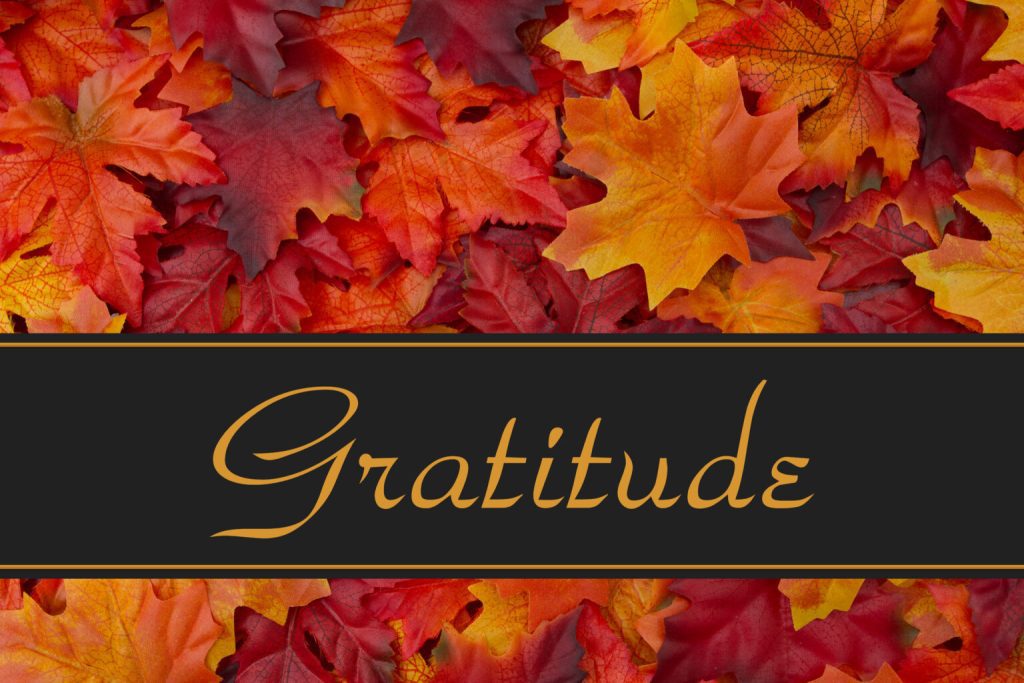As we enter into the season of Thanksgiving, gratitude is a common theme of conversation. We know it’s a valuable practice and we’ve experienced the positive impact it has when someone expresses gratitude towards us. However, gratitude can often feel hard when life is difficult and mental illness is a part of our daily experience. It can be easy for phrases like “just be grateful” to become platitudes that are unhelpful to those struggling with mental health issues, but a regular practice of gratitude in the midst of mental health struggles is a meaningful and effective practice. What if instead of suggesting gratitude as a way to dismiss someone’s struggle, we learned how gratitude can also be used as a form of grounding to reduce anxiety and as a way to boost your mood?
Gratitude as Grounding
Gratitude can be used as a grounding technique. What is grounding? Grounding is a practice or technique that brings your awareness to the present moment. We, as therapists, often recommend grounding practices to those who are experiencing anxiety, panic, or even symptoms of PTSD. The goal is to stop racing thoughts by bringing your awareness to something physical or present. There are many forms of grounding, both simple and complex. This season, why not try using gratitude as a way of bringing your attention to the present moment? When you start to notice thoughts racing, life feeling overwhelming, or other physical symptoms of anxiety take a moment and take a deep breath. Intentionally name (maybe even out loud) 3 things you are grateful for right now, taking a deep breath in between. If 3 isn’t enough, keep going. Use this as an opportunity to remind yourself of the beauty that is right in front of you. Consider engaging your senses by being grateful for something you can see or touch or smell or hear or taste. Actively engaging in your mind will force your brain to attend to something else, instead of ruminating on the negative or anxiety producing thoughts and feelings in your brain and body.

Mood-Boosting Gratitude
When we are feeling low, our minds naturally fixate on what’s going wrong and what may be causing us to feel down. People tend to have specific negative thought patterns that they get stuck in when experiencing depressive episodes but challenging these thoughts and replacing them with positive thoughts can boost our mood. What if the positive thoughts we replaced them with were ones of gratitude? As we bring our focus to what we have, it redirects our thoughts away from scarcity. The things we can be thankful for don’t have to be grand or perfect but rather simple things- the way the light comes in on a sunny afternoon, an unseasonably warm November day, a smile from a stranger, etc. Consider keeping a running list on your phone or a journal next to your bed to keep a written record of the things you are grateful for. There are even mood tracking apps that allow you to keep gratitude lists as you track your thoughts and moods over time, allowing you to be intentional about your thoughts and see patterns over time. As we begin to be intentional about noticing what is good and beautiful around us, we are rewiring our brains with positive thoughts instead of negative ones. This mindset shift can lift our moods and our thoughts can become less heavy.
Grateful For Treatment and Support
What if we could find things about struggles with mental health to be grateful for? While there are many challenging parts of living with anxiety and depression, even our suffering can stir up gratitude. Are there things you are learning from depression and anxiety treatment that maybe you wouldn’t have learned without it? Has it helped you to acknowledge your humanity and to accept your limits? Has it forced you to take better care of your body and mind? Has it motivated you to seek help or lean on your support system? Have you been able to lean into joy when it comes, knowing that it’s not always guaranteed? While we never want to minimize the pain of mental illness, we can move towards gratefulness for the growth and acceptance it has brought through therapy and reflection.
As we head into Thanksgiving and the holiday season beyond, let’s be sensitive to the fact that many people are struggling emotionally. As we learn to practice gratitude in our own challenges, it can be easier to connect with those around us and to model gratitude as an authentic way to cope with mental health struggles. If you or someone you love is struggling with depression and anxiety and would like professional support, we’d love to be a part of your support system and coping strategies. Give Milestones a call today at (443) 574-4295.
Submitted by: Carrie Campbell, LCSW-C – Therapist

